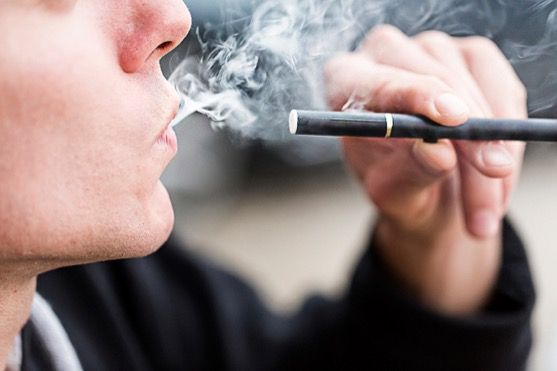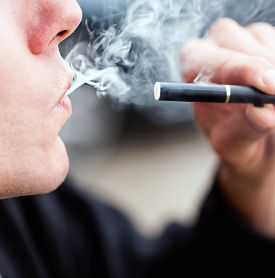E-cigarettes, a relatively new product in the Canadian market, is causing some advisors to question how they should fill in insurance applications, but insurance companies are cutting through the haze and treating them like a tobacco product.E-cigarettes don’t contain tobacco. Instead, there’s a mechanism that heats up liquid nicotine, which turns into a vapor that smokers inhale and exhale.
The question is then: is someone who smokes e-cigarettes now to be considered a non-smoker and should insurers lower their rates for them?

A number of people who “smoke” e-cigarettes use them as a new way to get off tobacco cigarettes, much like they have with patches and nicotine-based gum. E-cigarette companies have stated that eventually those wanting to quit smoking altogether will go to an e-cigarette that does not contain any nicotine, but still provides the person with the kind of hand-to-mouth sensation that they received from smoking regular cigarettes.
Against the law
But Health Canada is warning that all e-cigarettes, whether they make the promise of being a tobacco-cessation tool or not, are against the law in Canada.
“E-cigarette products, including e-liquids, that contain any amount of nicotine or have a health claim fall within the scope of the Food and Drugs Act and require approval by Health Canada before they can be imported, advertised or sold in Canada,” says media relations officer Gary Scott Holub.
Health Canada says no company has applied providing evidence showing that e-cigarettes are either safe or effective at helping Canadians to quit smoking. Without this scientific evidence, it is advising Canadians not to use these products until a full assessment is made.
“This means that currently, the importation, advertisement and sale of electronic cigarette products, including e-liquid, that contain nicotine and/or have health claims is non-compliant with the Food and Drugs Act, and is therefore illegal.
“Health Canada urges any Canadian who is trying to quit smoking to talk with their doctor and see what products are available to help them.”
Insurance companies are being wary, saying that there is a strong possibility that a person using e-cigarettes (with or without nicotine) may revert back to tobacco cigarettes.
“Indeed, this is new territory and there are still debates about this product,” said Sarah Twomey, a spokesperson for Desjardins Group.
But “the individual could still be considered a smoker as there generally is a higher risk factor that the individual could return to smoking, because it’s a similar activity that replicates smoking. Also some e-cigarettes can include a reduced amount of nicotine. Since there is no way to be sure if the individual is always using a non-nicotine e-cigarette, they would be considered a smoker, due to the possibility of nicotine-content e-cigarettes,” Twomey said.
E-cigarettes have stirred much discussion around insurance company board rooms these days, says Frank Zinatelli, vice president and general counsel at the Canadian Life and Health Insurance Association.
But most insurers agree that because of the nicotine in many of these e-cigarettes, they are concerned that people will go back to full-time smoking, said Zinatelli.
“What generally happens is that insurers wait a year or two until someone who has smoked can be deemed a non-smoker. The reason that happens is because many people who quit (then) relapse within a short period of time,” said Zinatelli. “With these cigarettes, if they are being used as a tool or an aid to quit smoking, the person would still be at risk of relapsing and that’s why they put in a term of time.”
He said the risk could potentially go the other way – in that those who start with e-cigarettes could eventually progress and begin to smoke tobacco cigarettes.
A number of advisors are being approached by clients or prospective clients wanting to buy a policy but noting they are not “real” smokers because they only use e-cigarettes.
John Kovats, CLU, a partner in The Benefit Guys in Cambridge, Ontario, says even if someone comes to him saying the e-cigarette does not contain any nicotine, he won’t write them up as non-smokers.
“I will not take the chance that this claim won’t be paid,” said Kovats. “This would affect my E&O insurance because if you die your beneficiaries don’t get paid the death benefit and then your lawyer will sue the insurance company and me too and I will not take that risk.”
At most, he suggests advisors send in a pre-assessment to the insurance company. Along with all the other required information like age and medical issues, he would include that the person uses e-cigarettes.
“But I would not send in any kind of an application at this point without a pre-assessment if they did want me to send the application in as a non-smoker,” he said. “I put in full disclosure, even if the person says they’re only smoking e-cigarettes and not real cigarettes. If the insurance company will accept their word, I have taken care of my due diligence.”
Nicotine-based category
Currently, all applications ask whether a prospective policyholder has smoked within a specified time period or has used any kind of nicotine product. A typical application says: “In the last x years [depending on the insurance product], have you used or smoked any of the following: cigarettes, any form of marijuana (such as hashish), cigars, pipe, cigarillos, chewing tobacco, nicotine substitutes (such as gum or patches), other (example: betal nuts).” E-cigarettes are expected to fall into the nicotine-based category.
But just to make sure, John Dowson, an advisor with Lifetrust Planning in Newmarket, Ontario, recently asked a couple of insurers their views on the e-cigarette subject. The answer was clear: if the e-cigarette has nicotine, potential policyholders are still considered smokers.
Now Dowson asks all non-smokers whether they use e-cigarettes – above and beyond the usual wording. “It’s like the patch: I had a client who said they didn’t smoke but they used the patch,” says Dowson. “So I put that down and the insurance company came back and said no, that’s a smoker. They are treating this the same way. The patch has a small amount of nicotine as well. The insurers tell me that any amount of nicotine and a potential policyholder is considered a smoker.”




